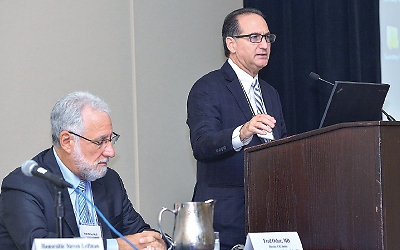Psychiatrists and judges must learn more from each other to make headway together in dealing with the thousands of people with mental illness confined in U.S. jails and prisons, said speakers at the Judicial-Psychiatric Leadership Forum in Philadelphia last month.
“Having doctors at the table is important,” said Judge Ernie Glenn of San Antonio, Texas. “They understand far less about what we do than they should, and we understand far less than we should about what they do.”
Jail should be the last place for people with serious mental illness, rather than the first, emphasized Miami-Dade County Judge Steven Leifman head of the Judges’ Criminal Justice/Mental Health Leadership Initiative (JLI) and a long-time champion of reform, addressing the 60 psychiatrists, judges, and court administrators at the forum. “We have the leaders in this room to make a difference and change a horrific policy that has been an absolute, intolerable, unacceptable failure.”
There needs to be a mutual recognition by judges and psychiatrists of the need to rehabilitate the prisoner and protect public safety, said Fred Osher, M.D., director of health systems and services policy at the Council of State Governments Justice Center in New York. “I have optimism about the ways we can move forward.”
The Judicial-Psychiatric Leadership Forum was cosponsored by the Justice Center, the JLI, and the American Psychiatric Foundation. Leifman is a member of the foundation’s board.
Judges have a great advantage when they want to get something done, said former Ohio Supreme Court Justice Evelyn Stratton. “People listen to judges, and judges are used to being obeyed,” Stratton noted.
Most of the judges in attendance were already part of the solution, working in mental health, drug, or veterans courts or other specialized dockets.
However, mental health training, perhaps in the form of continuing legal education, should also be expanded to reach judges in the system who do not have experience in specialty mental health courts, said Glenn. Better yet, crossover education should start early in professional training, in law school and medical school.
The two professions could do more at both the beginning and end of a prisoner’s sojourn in the criminal justice system, since special mental health courts get only a small number of those with mentall illness. For example, judges could encourage police training to divert people with mental illness to hospitals for evaluation before they are arrested, because it’s much harder to get them out of the system once they’re inside.
More than 4,000 police officers in the Miami area have been trained to do just that, reducing arrests of people with mental health problems sufficiently to permit. Miami-Dade County to close one of its jails, its Women’s Annex, earlier this year. The average number of inmates fell from around 7,400 a year to just 4,800 at latest count, saving about $12 million a year. There was also a 73% reduction in jail bed days.
“Judges and psychiatrists are both interested in gathering information,” noted Michael Champion, M.D., director of Champion Forensic Services in Santa Fe, N.M. “Judges can do a good social history but don’t know how to turn that into a defined intervention strategy, and information is sometimes blocked on the psychiatrists’ side as well, because clinicians are not clear about what the information will be used for. Will it help or hurt the patient?”
Both groups struggled with the problem of transitioning people out of the criminal justice system. Clear release policies and procedures are needed for people with mental illness who are being treated in jail or prison, and then connections must be made with outside mental health providers.
One county found a simple solution: faxing or e-mailing a list of prisoners about to be released to local mental health agencies, said Judge Chad Schmucker, state court administrator for the Michigan Supreme Court. The agencies frequently find the names of released inmates who were already on their client list and reconnect with them after release.
“We need to bring the criminal justice system into the continuity of care,” agreed Debra Pinals. M.D., an associate professor of psychiatry and director of forensic education at the University of Massachusetts Medical School.
The dialogue between the two professions has to continue, Leifman and Osher maintained. They want to see more, and larger, meetings like this one, to expand the interactions.
“We need an army of you,” Osher told attendees. “Let’s go back to our communities and work together on this issue.” ■

